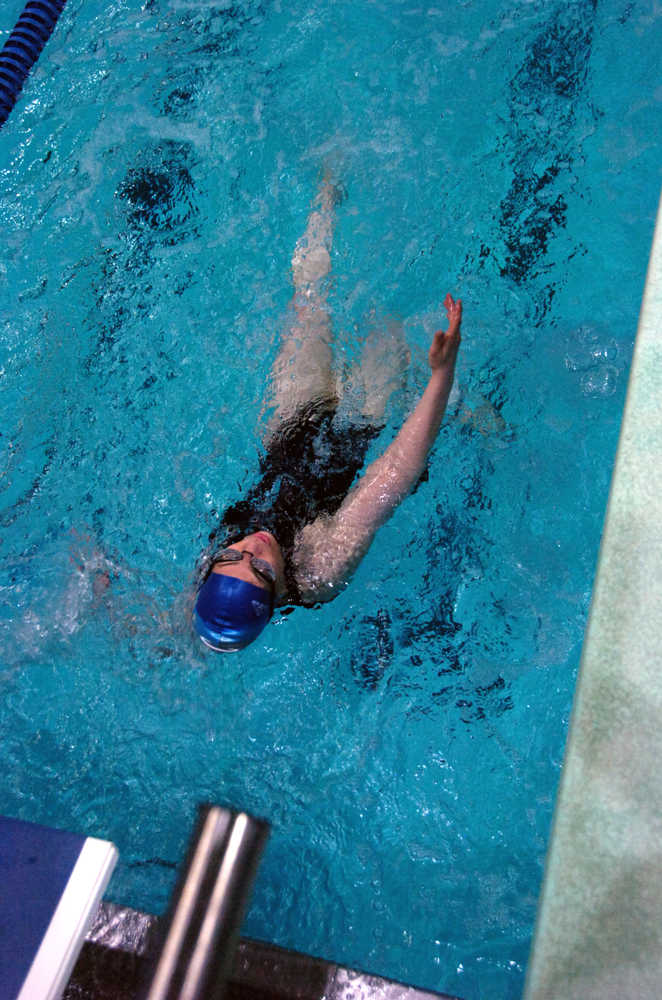Two Special Olympics teams met on Saturday at Soldotna High School to compete in swimming and basketball. The teams from Homer and from the Central Peninsula, with members from Kenai, Soldotna, and Nikiski, included athletes who ranged in age from 12 to their mid-forties. At the meet, athletes had the opportunity to qualify for the state-level Special Olympics in Juneau.
Sarah Arts, Director of Sports and Programs for Special Olympics Alaska, said that both swim teams meet for practice once a week. To qualify for Saturday’s meet, athletes had to have at least ten hours of training over 8 weeks.
“They’ve been working on all of their different strokes and their techniques to make sure they’re doing the stroke properly,” Arts said of the two swim teams. She said that the standards of the Special Olympics are similar to those of a competition for the non-disabled.
“Especially with swimming, we really try to mirror an actual swim meet,” Arts said. “So we do have a lot of disqualifications for improper swim strokes. We try to division equitably so the athletes have equal competition. That makes it very competitive for the athletes. They’re swimming against somebody who’s their same age, gender, and ability, so they have a lot more opportunity to have that competitive nature.”
Arts said that maintaining a “competitive nature” is important to the event.
“Our athletes are seen as athletes, and they’re treated like athletes,” Arts said. “They’re not treated like somebody who has an intellectual disability. They’re treated as someone who’s training and working hard in their sport, that’s put in their time to get better.”
The basketball portion of the meet included two events: a skills exercise that tested individuals on dribbling, shooting, passing, and running, and a five-on-five team competition. Arts said that the Homer team was unified — meaning that in addition to three Special Olympics Athletes, it included two non-disabled partners. Arts said that unified sports are becoming more common for disabled athletes, especially in school programs. As an example, Arts gave Soldotna’s track team, which has disabled and non-disabled athletes competing together and which she said was one of the largest unified track programs in the state.
“Unified is really great because it’s inclusive,” Arts said. “It gets the general ed students together with the special ed students. So more and more adults that are joining Special Olympics are coming from a unified school program. They’re expecting to have unified partners on their team, or to be able to play sports with them. The way that we’re evolving as a society towards more inclusive opportunity, it’s really important that Special Olympics is providing inclusive opportunities for athletes and partners to compete together.”
As individual sport, swimming provides less opportunities for unification than basketball, but Arts said that the program hopes to include a unified relay event in the future.
“By providing unified sports, we’re giving Special Olympic Athletes the ability to play alongside their peers,” Arts said.
“Those partners are the future employers, or the future educators, or they might be someone they see at the grocery store all the time… I would hope that Special Olympics is a part of that evolution of society, where we’re becoming more inclusive and providing more opportunities for Special Olympic athletes and the general population.”
Like any sporting event, the Special Olympic meet drew a crowd of fans. Swim coach and Hope Community Resources caregiver Jill Smith estimated that over 50 people had come to cheer the athletes.
“There’s some providers, there’s some family members, there’s some people in the neighborhood,” said Smith. “There’s a sign that says ‘go team.’ That’s really cool. We have fans in the stands!”
Three of the sign-waving fans were Charlissa Magen of Soldotna, caregiver and swim coach Stan Vogel, and Patricia Trujilluo, who had watched Magen’s son Darryl swim. Darryl Magen, who suffers from mental disabilities and the motor disorder apraxia, learned to swim three years ago. Last year, he won a gold medal in the 25 meter freestyle race at the state Special Olympics in Anchorage.
“He wasn’t a swimmer at first,” said Charlissa Magen. “Now he just loves it. And he’s not a competitor. That’s the thing we have to encourage him about, because he’s a team player. He likes to see everybody do well.”
“When the bell goes off, he looks at the other guys like, ‘is it time for us to go?’” Vogel added. “He gets the idea of competition, friendly competition. And he competes with himself… He’s aware that he took gold last year, and he wants to continue that.”
Magen said that swimming has helped her son’s medical condition.
“It helps his endurance and his stamina,” Magen said. “He loves physical challenge now. Before Darryl was pretty sedentary… He’s lost a lot of weight. I think it’s been about 80 pounds. Swimming has helped his breathing, his endurance.”
Magen said that her son practices frequently.
“When he’s out practicing at Nikiski pool, he’s got his markers and he’s out swimming laps,” Magen said. “He wants to do one more than he did the last time.”

